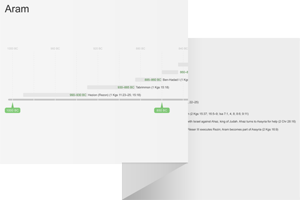28:1–27 The Chronicler’s account of Ahaz follows 2 Kgs 16:1–17:5. |
28:1 And he did not do what is right Ahaz is portrayed as extremely unfaithful (2 Chron 29:19, 22).
28:2 the ways of the kings of Israel Ahaz followed after the pattern of the wicked northern kings. Ironically, the northern kingdom of Israel repents during Ahaz’s reign (vv. 9–15).
28:3 in the valley of Ben-Hinnom See note on Jer 7:31.
and burned his sons See 2 Kgs 16:3 and note.
28:4 on the hilltops A standard reference to the location of Canaanite religious sites.
under every flourishing tree See note on Jer 2:20.
28:5 Then Yahweh his God gave him The result of Ahaz’s idolatry is military defeat. Disobedience or unfaithfulness in Chronicles is almost always followed by judgment (see 2 Chron 24:20–25; 25:20; 26:16–21).
the king of Aram Elsewhere identified as Rezin (2 Kgs 16:5).
King of Syria | Date | Southern King | Date |
Ben-Hadad III | 796–792 bc | Uzziah (Azariah) | 792–742 bc |
Rezin | 740–732 bc | Jotham | 742–735 bc |
Ahaz | 735–715 bc |
28:6 Pekah The king in Israel when the Assyrians first began deporting people from the northern kingdom (2 Kgs 15:29).
because they forsook Yahweh The Chronicler again emphasizes that Judah’s defeat is because Ahaz abandoned God (2 Chron 12:2; 21:10; 24:20).
28:8 women, sons, and daughters By referring to relatives, the Chronicler emphasizes the close relationship between the northern and southern kingdoms, Israel and Judah.
Samaria This city became the capital of the northern kingdom after King Omri purchased it (1 Kgs 16:24).
of the northern kingdom after King Omri purchased it (1 Kgs 16:24).
28:9 against Judah Oded makes it clear to the men of Israel that their victory came because of God’s anger at Ahaz’s sin. The Chronicler often emphasizes God’s sovereignty in battle (see note on 2 Chron 13:16).
you killed them in a rage Although God gave Judah into the Israelites’ hand, they exceeded what God allowed.
28:10 Is there not also guilt on your part against Yahweh your God? As the leaders of Ephraim acknowledge, Israel’s guilt was already great (v. 13).
28:11 the fierce anger of Yahweh God warns Israel that the same anger that caused Him to give Judah into Israel’s hand (v. 9) would now be focused on Israel.
28:13 great anger against Israel Israel will soon feel the effects of God’s wrath as Assyria carries them off into captivity (2 Kgs 15:28; 16:9; 17:6).
28:15 gave them food to eat The leaders of Ephraim do not just release the prisoners; they show kindness to them by clothing them, cleaning them, and giving them provisions.
28:16 to the king of Assyria Faced with challenges from both the Edomites and the Philistines, Ahaz turns to Assyria instead of turning to God. The importance of relying on God instead of foreign alliances is a theme throughout 2 Chronicles. See note on 2 Chr 14:11.
28:18 the Shephelah The low hills between central Judah and the coastal plain.
28:19 acted unfaithfully The Hebrew word used here, ma'al, occurs throughout -2 Chronicles to describe a breach of faith (see note on 1 Chr 5:25). The form used here, ma'ol ma'al, is meant to emphasize the extent of Ahaz’s faithlessness.
28:20 and brought trouble for him The Assyrians did help Judah by eliminating some of its enemies and bringing a temporary peace (2 Kgs 16:9). However, this came at a cost to Judah both financially and spiritually (2 Ch 28:21; 2 Kgs 16:10–16).
28:21 but it was no help to him The Chronicler highlights the ineffective help from other nations, contrasting it with the powerful help that comes from God (e.g., 2 Chr 14:11; 16:12; 18:31; 20:4; 25:8; 26:7).
28:22 continued to act unfaithfully against Yahweh See note on v. 19.
28:23 the gods of Damascus The account in Kings notes that Ahaz had Uriah the priest make a model of the altar in Damascus (2 Kgs 16:10–11).
they will help me Just as he looked to a foreign alliance for help instead of to God (2 Chron 28:16), Ahaz now looks to foreign gods for help.
28:24 he cut the objects of the house of God to pieces The parallel statement in 2 Kgs 16:17 describes Ahaz separating bronze stands from their frames. These stands, commissioned by Solomon, are described in detail in 1 Kgs 7:27–37.
28:26 the remainder of his words A common epitaph for deceased kings (e.g., 1 Kgs 11:41; 14:19).
the scroll of the kings of See note on 2 Chr 16:11.

|
About Faithlife Study BibleFaithlife Study Bible (FSB) is your guide to the ancient world of the Old and New Testaments, with study notes and articles that draw from a wide range of academic research. FSB helps you learn how to think about interpretation methods and issues so that you can gain a deeper understanding of the text. |
| Copyright |
Copyright 2012 Logos Bible Software. |
| Support Info | fsb |
 Loading…
Loading…


